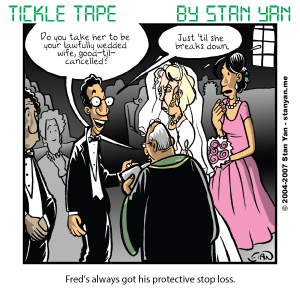Whether you are a novice trader facing one of your first losses or a seasoned professional experiencing a severe drawdown, no one likes to lose. Losses hurt, psychologically and financially. Although losses are commonplace in the trading profession, it’s often hard to take them in stride. Losses can take over our emotional life. Suddenly, we may feel beaten and ready to give up.
But winning traders are eternal optimists. They have to be. That said, don’t think that accepting losses is a simple matter. In order to take losses nonchalantly, you must prepare for them. It is vital to develop the right mindset so that when you experience a loss, you won’t be fazed by it. You’ll accept it, view it as a minor setback, and just move on.
How we feel about losses is deeply rooted in childhood. Parents rewarded us when we met their expectations. Teachers gave us good grades when we performed better than the rest of the class. When we entered the world of work, supervisors gave out the best prizes to those who were the most productive. We may carry some of these early experiences into the trading arena, thinking that a loss is a form of punishment. It’s natural to panic a little when experiencing a loss.
You may feel guilty for breaking a moral imperative to always do well, or embarrassed that the markets have beaten you. You may have a natural inclination to feel crushed, and this can lead to errors in judgment. Novice traders, for example, may start trying to undo the loss by making some quick wins. They may abandon their risk limits, make impulsive trades, or take low probability setups, all in an attempt to counter feelings of humiliation and hurt.
You can’t let a loss set off an automatic panic response. By preparing for losses, you can react calmly and decisively. First, manage risk and make sure that from a purely financial viewpoint, you can survive a loss. If you have a million dollars in your account, a $10,000 loss isn’t all that bad. But if you’re trading a $100,000 account, then a $10,000 loss is hard to ignore. By making small trades, and trading with money you can afford to lose, you’ll be able to handle losing trades more easily.
Don’t be afraid to view the actual economic repercussions of your losses. If there’s the little real long-term impact, you’ll feel better. If the long-term impact is substantial, then make sure you have an escape plan (for example, make sure you have a part-time job lined up or a plan for getting a short-term loan). In the end, the best defence against losses is to feel secure in the fact that they have no real long-term impact.
The second set of strategies for preparing for loss is psychological. People who overreact to losses usually hold a set of assumptions and beliefs that make them upset. For example, they think that a loss illustrates inadequacy. Instead of instantly letting these assumptions take over, it’s useful to list a set of beliefs that helps you deal with losses.
Make the list and rehearse each statement in preparation for a potential loss. There are positive ways to interpret losses, and you can add them to your list: “Losses are tuition I pay to learn how to trade skillfully. I should expect to lose; it’s not personal. A loss is just a minor setback; I’m not going to let it take me out of the game.
Even a loss is valuable; it allows me to add to my wealth of knowledge.” After making your personal list, read the statements over and over. It will help you quickly remember them when you actually encounter a loss. By anticipating losses and planning to look at them in a positive light, you can take them in stride. It may still hurt, but it won’t hurt as badly. And in all likelihood, you’ll stay calm, energized, and ready to fight back.


